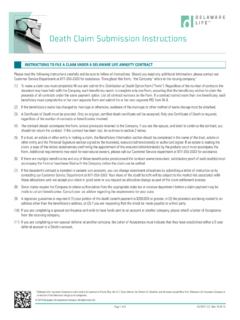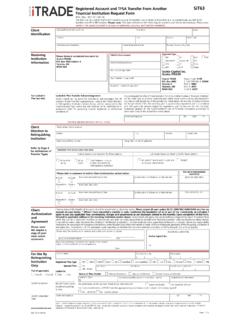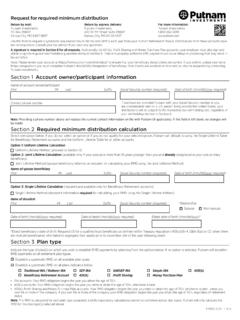Transcription of Designating Beneficiaries through Contractual …
1 MontGuideFor More Online MontGuides, Visit MT199901HR Revised 3/18 Learn about transferring your assets through Contractual arrangements, such as those commonly found in insurance policies, IRAs, employee benefit plans, payable on death accounts and transfer on death accounts. by Marsha A. Goetting, , CFP , CFCS, Professor and Extension Family Economics Specialist, Montana State University-Bozeman; Joel Schumacher, Extension Economics Associate Specialist, Montana State University-BozemanDefinitionsThroughout this MontGuide, the term financial entity refers to a financial institution, ( bank, credit union, insurance company, pension plan, employee benefit plan and other entities that provide Contractual arrangements).
2 The terms proceeds and assets refer to real and personal property that pass from an owner to his or her designated Beneficiaries by Contractual arrangements with the financial entity. The term beneficiary designator refers to the person who designates the Beneficiaries on the Contractual arrangement. Contracts and ProbateProbate*, a legal procedure that generally takes place to settle a deceased person's estate, is not required for assets controlled by Contractual arrangements. Although probate may be avoided with Contractual arrangements, assets that pass to Beneficiaries through Contractual arrangements are still subject to federal estate taxes as well as creditors' claims against the decedent's estate.
3 There is no federal estate tax on a decedent's assets that are valued at less than $ million in Montana Multiple Party Accounts Act* allows for payable on death designations on financial accounts at banks, savings banks, and credit unions. If there is more than one beneficiary on the account, the sum on deposit will pass to them in equal shares. Designating Beneficiaries through Contractual ArrangementsWHEN PEOPLE PASS AWAY, THEIR PROPERTY can be transferred to their Beneficiaries by three methods: Contractual arrangements, written wills*, or Montana intestate succession statutes* (laws for those who did not have a written will).
4 This MontGuide focuses on Contractual arrangements in which owners designate a beneficiary to receive either all or a percentage of their property. Contractual Arrangements Contractual arrangements that specifically provide for the passing of property to a beneficiary are considered as transfers taking effect at death. The following types of assets provide for the naming of Beneficiaries through Contractual arrangements: life insurance and annuity policies; qualified and nonqualified deferred compensation plans [401(k), 403 (b), 457]; individual retirement accounts (IRAs); employee benefit plans [SEPs, SIMPLEs] and Keogh retirement accounts; revocable (living) and irrevocable trusts*.
5 Payable on death (POD) designations for checking and savings accounts, certificates of deposit, share certificates, United States savings bonds; and transfer on death (TOD) designations for stock, bond, and mutual fund accounts beneficiary deeds for real property in Montana* Starred topics are further explained in other MSU Extension MontGuides. See the list on page 8 for details. 2 Contracts and WillsContractual arrangements take precedence over a person's written will. Example 1: If a mother named her son as the beneficiary of her $100,000 life insurance policy and later wrote a will leaving the same life insurance proceeds to her daughter, that part of the will would be considered ineffective.
6 The contract has priority her son receives the $100,000 in life insurance proceeds because he was named primary beneficiary on the contract, not her daughter. If the mother wants her daughter to receive the $100,000 she needs to request a change of beneficiary form from her insurance company. She must then list her daughter as primary personal representative (the person appointed to settle your estate) has no power or duty to administer Contractual arrangements unless the estate is the beneficiary .
7 Then the personal representative distributes the assets according to the will. If the deceased did not have a will the property is distributed by Montana law to heirs. See Dying Without a Will in Montana*. The personal representative or a family member should notify the financial entity about the death of the insured, annuitant or owner of an account. The financial entity is responsible for distributing the proceeds or assets to the specific Beneficiaries that are listed on the beneficiary designation form.
8 Most financial entities require a specific claim form and a certified death certificate to be submitted before the proceeds will be transferred to the Beneficiaries . Joint Tenancy ContractsWhile a joint tenancy with right of survivorship title* on real ( land, house) and personal property ( checking and savings accounts) is not technically a beneficiary designation, if one joint tenant passes away, the surviving joint tenant(s) automatically receive all. Joint tenancy property does not have to go through a court administered probate process.
9 Joint tenants cannot leave their interests to someone other than the surviving joint tenant in a will unless the survivor lives beyond 120 hours (See page 6 for common disaster clause). Nor do their interests pass to their heirs by state intestate statutes because the joint tenancy contract has priority. The surviving joint tenant or tenants receive all. The decision to place property in joint tenancy with family members or others should be made only after serious consideration has been given to the consequences of such an arrangement.
10 Creditors ClaimsBeneficiaries named in contracts should be aware that the deceased person's assets are subject to creditors' claims and taxes. For example, if a person dies owing money to a hospital, the hospital is a creditor. If there are enough assets in the probate estate to cover the hospital bills, then a certificate of deposit with a payable on death designation for example, would not be used to cover the decedent's hospital expenses. However, if there are not enough assets in the probate estate to pay creditor's bills, then the certificate of deposit with a payable on death designation would be subject to the hospital's claim.











